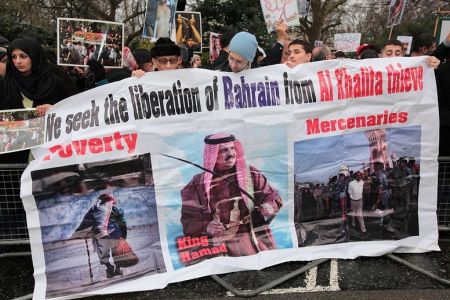Alwaght-After three years, the main approach of Bahraini regime against the 2011 revolution in Bahrain and revolutionaries of this country is taking Shiites away from obtaining political power in any form. Accordingly, the political power structure in Bahrain that is clan-based and undemocratic will be remained without any significant change.. According to Al-Khalifa, any democratic change in this country will lead to a lion share for Shiite groups in political power structure, since Shiites make up the majority of the citizen population in Bahrain. Therefore, the Al-Khalifa's main strategy is to prevent and oppose any serious and profound reforms in Bahrain by different techniques and methods.
To achieve their objectives, the trivial and superficial reforms & dialogue in social and economic areas, and limiting enquiries of opposition groups have been considered as the main ways of Al-Khalifa against Bahraini revolutionaries. National dialogue in Bahrain idiosyncratically arranged by Al-Khalifa aimed at setting out issues related to the political and power structure in Bahrain. Accordingly, they tried to marginalize political groups particularly Al-Vefagh in Bahrain National Dialogue by focusing on the marginal not main issues such as economy and social affairs. By doing so, they want to control the crisis in Bahrain without giving main political advantages to their opposition.
This approach of Bahraini regime has been faced consecutive failures in different periods. Their last failure to achieve their objective by this approach was in early 2014, when they could not satisfy the opposition such as Sheikh Ali Salman, the head of opposition movement negotiating with Al-Khalifa. Sheikh Ali Salman was aware of Al-Khalifa's main objectives. As mentioned before, there was no tendency and will to give real advantages to the opposition groups particularly in political scene of Bahrain.
According to Bahraini opposition groups, this national dialogue held by Al-Khalifa was a way to show a good face of this regime in international organizations of human rights that were against Al-Khalifa's actions. They did their best to hold these negotiations along with extensive regional and international advertising in order to provide a favorable aura for suppressing Bahraini revolutionaries who were not at the negotiating table due to Al-Khalifa's predetermined filthy political game. The failure of this Dialogue can be predictable.
According to Bahraini regime, the intense security pressures of Al-Khalifa over Bahraini protestors will not make the situation of Shiites in this country better; it will provide an aura for suppressing Bahraini protestors. Such a security aura in the one hand may cause concern for US and on the other hand will attract foreign countries' attention and consequently their cooperation. As a result, domestic concern about Bahrain crisis will change to regional and then international concerns that can attract regional and international opinions against Bahraini opposition. They instill in the critics' minds, those opposition groups of Bahrain who are not around the negotiating table any more are not a cultural and social movement with bearable approaches but a movement that are trying to overthrow Al-Khalifa's regime with unbearable approaches.
Bahrain crisis and consequently security aura in Bahrain will challenge Shiites and their social and political position in Bahrain in the future. In such a security aura, Bahraini security officials feel free to do whatever they want against the revolutionaries. This security aura will save the face of this regime and their actions seem legal, accordingly. Over years, this trick has been used by different governments in order to justify their violence and non-humane actions due to security emergences and issues.
Bahraini protestors were sentenced in security and military courts by Al-Khalifa's agents and maximum punishments were considered for them, since their cases were examined by a security hardline view against Shiites of Bahrain. In addition, opposition politicians are deprived from some of their own civil rights such as candidacy, etc., and even wounded protestors are not cured in hospitals.
When a Bahraini protestor assume that unemployment, being deprived from higher education and health care, travel ban, etc. , will be the cost of "protest on street", s/he naturally change or reconsider his/her approach and will not protest on the streets of Bahrain anymore. This is the best option for Al-Khalifa's regime. By doing so, Al-Khalifa tries to plan negotiations, and creating an intense security aura in Bahrain. Accordingly, all of Al-Khalifa's illegal actions against revolutionaries seem legal, since intense actions are needed in security crises for preserving governance and government.



























